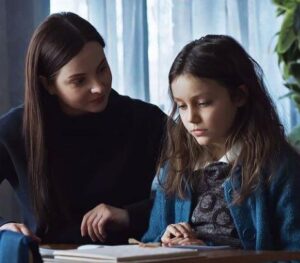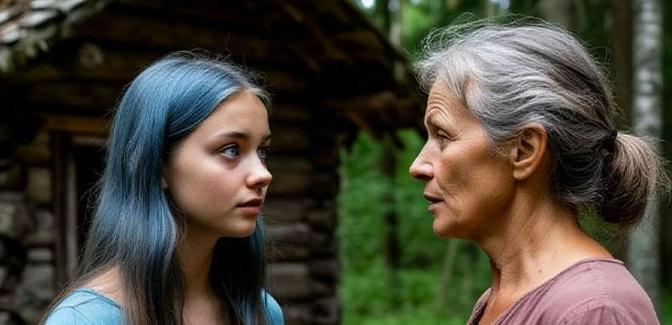Andrej, promise me… promise me you won’t leave Larisa alone,” whispered Nina from her bed, her voice delicate as a whispering breeze yet laden with earnest pleading. “You know how fragile she is. She needs continuous care… I understand it’s hard, but I fear she won’t make it on her own. You remain her guardian for two more years… Please, take care of her. Do it for her… do it for me.”
Andrej nodded silently, clenching his teeth to conceal the storm of feelings beneath. His fingers clasped her bony hand, covered with thin, translucent skin. On the outside, he appeared composed; internally, turmoil raged. His wife’s words echoed softly, while his mind was already consumed by a single desire: freedom. The end of the nightmare. The dawn of a new life.
When Nina fell ill, the devastation overwhelmed him. He trusted the doctors and clung to hope for recovery. Rushing from one specialist to another, importing medicines from abroad, studying medical books — all fueled by desperate optimism. Yet, as time passed, his hope melted away like snow under the sun. Exhaustion weighed on him: the sterile hospital smells, the nights broken by relentless coughing, and above all, his weariness of Larisa.
The stepdaughter lived under the same roof but was as intangible as a shadow. She was never truly his child. Fate had imposed her presence—an unspoken burden he carried silently. Andrej neither hated her nor loved her. Only a draining weight gnawed at his soul. Within his mind, a persistent thought hammered: “I have but one life. I want to live it.”

He had once contemplated abandoning Nina. Yet, how could he forsake a dying wife without facing social condemnation? Friends, neighbors, and relatives would never forgive such a betrayal. The turning point arrived when a doctor declared, “No more than a year.” Then, Andrej resolved to endure—much like tolerating a toothache before a dentist appointment. The prize at stake was a grand inheritance: Nina’s four-room city apartment from her first husband. A home of immense value—the gateway to a revitalized future.
And Larisa? Just an obstacle. A frail, sick girl, an outsider. He pondered ways to rid himself of her without dirtying his hands. Institutionalization, nursing homes, sanatoriums… or better yet, the countryside, where she could quietly vanish without questions. She would not die within his walls.
Nina’s funeral was cold and swift. Sparse flowers, few attendees. Over the years, friends and family had drifted away. Andrej wished neither tears nor memories; he only sought to close that sorrowful chapter.
That very day, Andrej met Liza—a young woman whose radiant smile seemed to brighten the air. She had arrived alone; her partner abandoned her midway, denying even taxi money. Thumbing a ride, fate brought Andrej to stop for her. A chance meeting, a few casual words, then many encounters. Within weeks, Liza was living in his apartment.
With Liza, Andrej rediscovered lost lightness: leisurely walks, laughter, the thrill of finally feeling alive. Yet, Larisa remained an ever-present shadow, silent at the table, eyes defiant, ready with biting sarcasm. This constant presence obstructed their shared joy.
One day, desperate, Liza confronted him:
- “Do something, or I’m leaving.”
- “What could I possibly do?” he replied bitterly.
- “Couldn’t you… well… get rid of her?” she murmured.
Andrej’s eyes widened in shock. She laughed and added, “Relax, just joking. But didn’t you say Larisa has a country house?”
Thus, they conceived a plan: feigning the doctor’s recommendation for “fresh air and sunshine,” they would take Larisa to that old farmhouse, hire a caretaker, and then vanish. The rest was left to fate.
Three days later, everything was set.
“Larisa, we’re going to the countryside,” Andrej announced.
“Countryside? Why?” she retorted sharply.
“The doctor said fresh air would do you good.”
“Does this doctor happen to be named Liza?” Larisa replied with sarcasm.
Andrej’s face darkened. “Why treat her that way? She only wants the best for you.”
“Sure… and you forgot my mother all too quickly.”
Andrej said nothing, simply drove on.
The journey was long. During a stop, an elderly lady approached Larisa, offering herbs. She glanced at Andrej and said calmly, “Your ailment won’t be cured with herbs.”
“And what illness do you assume I have?” Andrej snapped.
“Cowardice and greed.”
Andrej muttered a curse and turned away. Yet the same old woman, now homeless, agreed later to join them and care for Larisa. Her name was Aljona.
Thus, Andrej left the girl in the countryside, entrusting her to the wrinkled hands of this unknown woman. He did not look back as he drove off.
Larisa stared at the dust rising from the receding car.
“He came here to leave me to die, not to heal me,” she said with a bitter smile.
“Die? We’ll see about that, my dear. I’ve seen worse get back on their feet,” the old woman replied.
So began a new chapter. The country home, the silence broken only by birdsong, the smell of bread that Aljona kneaded every morning. Worn and wary, Larisa found solace in this maternal figure. One day, Aljona gave her an old doll, instructing her to place it near her bed; inside it hid a bundle of money.
“With this money, we can live,” she whispered.
“Live? Darling, it’s enough for years,” Aljona laughed. “And we’ll plant a garden too.”
Gradually, Larisa began to recover. Her appetite returned, strength grew. She ventured to the lake. For the first time in years, she wept—not from despair, but from hope.
A village boy named Dima came by, bringing fresh milk and gazing at her with caring eyes. With him and Aljona, Larisa rediscovered the simple joy of life.
Two years passed.
Andrej, drowning in debts, decided at last to sell that forgotten farmhouse. He left with Liza, expecting ruin. Upon arrival, smoke rose from the chimney; the snow-covered paths were neatly swept.
“It doesn’t look deserted at all,” Liza noted.
As they talked, two figures appeared skiing: a young man and a vibrant woman — Larisa, stronger and livelier than ever.
“Well, would you look at that! The dear stepfather and his ragged girl,” she remarked sarcastically.
Andrej stood speechless. “Larisa! But you…”
“Did you think I was dead? Disappointing you will be my pleasure. In two months, I turn eighteen, so pack up and leave our home.”
The young man beside her stared at Andrej fiercely. Liza grabbed her companion’s arm and led him back to the car. Andrej lingered a moment longer, speechless: his schemes and greed collapsed instantaneously.
From the door, Aljona emerged, wiping her hands on her apron:
“Oh, you’re back? I just baked a stack of pancakes. Or maybe it was just the wind making noise,” she said as Larisa passed and kissed her cheek.
“Yes, it must have been the wind, don’t mind it. Come, let’s eat your pancakes. You know how much I love them.”
The door closed behind those who, against all odds, reclaimed the life that had been so cruelly withheld.
The story of a stepfather who took his sick stepdaughter away to the countryside to spend her final days in oblivion under the care of an elderly nanny took an unexpected turn years later when he returned to sell the house. It reveals themes of despair, selfishness, renewal, and hope.
This narrative demonstrates how desperation and greed can distort familial bonds, but also how resilience and kindness can pave the way to healing and new beginnings. Larisa’s transformation from a neglected girl into a vibrant young woman illustrates the profound impact of care and compassion, even in the most unlikely places.
Key Insight: Sometimes, life’s most unexpected paths lead to the greatest rebirths, teaching us that hope and strength often arise where we least anticipate them.
